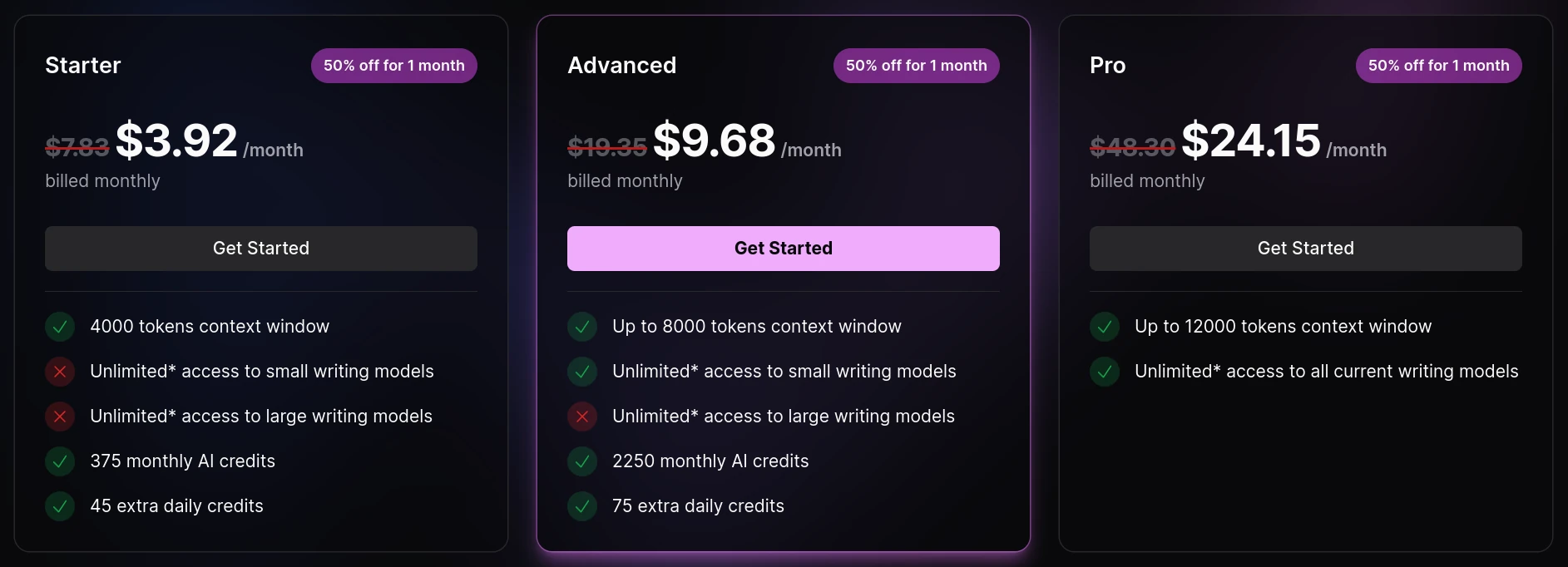Evaluation of SudoWrite vs. NovelAI
Helpful Summary
- Overview: We review two of the leading AI writing tools for creative writers—SudoWrite and Novel AI. We also introduce you to our own alternative AI-assisted creative writing tool, DreamGen.
- Why listen to us: We've spent a long time developing, testing, and using a wide range of AI roleplay tools and story-writing platforms for writers, fan fiction enthusiasts, and creative minds.
- Why it matters: AI creative writing assistants can help writers generate ideas and save time. However, choosing the right tool is an important part of unlocking these benefits.
- Action points: SudoWrite is a tool designed for creating and organizing professional long-form content, while Novel AI is more suited to hobby and fan fiction writers. DreamGen offers a good balance of deep features and user-friendliness.
- Further research: Check out the DreamGen blog for more helpful guides, AI writing tool recommendations, and more.
Want to Compare SudoWrite and Novel AI?
The AI writing assistant space is largely focused on marketing. Tools like Jasper and WriteSonic are great at what they do, but they’re definitely not designed for creative writers, novelists, or fan fiction writers.
Luckily, there are a ton of AI writing tools popping up that are specifically designed for creative writing. SudoWrite and Novel AI are two of the most popular, but DreamGen (that’s us!) is another option to consider.
So, which tool is the best for your writing needs?
In this guide, we’re helping you answer that very question with an in-depth comparison of SudoWrite, Novel AI, and DreamGen. We’ll cover features, pricing, use cases, and more to help you find the perfect option.
Let’s dive in.
Why Listen to Us?
Understanding the differences between AI writing tools like SudoWrite, Novel AI, and alternatives can be tricky. At DreamGen, we aim to give you an unbiased look at the AI creative writing tool landscape through guides, tool recommendations, and expert advice.
We’ve worked hard to make DreamGen the ideal tool for unrestricted creativity (powered by AI), and in the process, we’ve learned a lot about what to look for in AI writing tools. So let’s put that knowledge to use and help you make the best decision for your writing needs.
SudoWrite vs. Novel AI vs. DreamGen: An Overview
Before we dive into the details, here’s a quick overview of the three tools we’ll be covering.
- SudoWrite: First up, SudoWrite—this tool is a bit like Jasper, but aimed squarely at creative writers and narrative storytelling. Its main strengths are a great editor, a massive suite of features (more on those later), and good style emulation. It’s let down by a confusing pricing model (that some users describe as greedy) and a somewhat overwhelming interface packed with features you may (or may not) actually use.
- Novel AI: Novel AI is another popular AI writing tool, this time more focused on making writing narrative fiction easy and fun. Key selling points include a simple UI, a small (but well-developed) feature set, and decent proprietary models. Areas for improvement include more customization options and increased reliability (the AI tends to lose the plot quickly).
- DreamGen: And finally, DreamGen—we’re a newer player in the market with a focus on both serious storywriting and entertaining roleplay (like a combination of SudoWrite and Novel AI). Our proprietary, open-source models are trained to generate compelling narratives while adapting to your style for a cohesive story. We also offer tools for organizing characters and plot points, customizing outputs, and steering your stories effectively.
What Is SudoWrite?
SudoWrite is probably the most popular AI creative writing assistant. It’s designed to give creative writers a full suite of AI-powered tools for ideation, planning, organization, writing, editing, and even feedback.
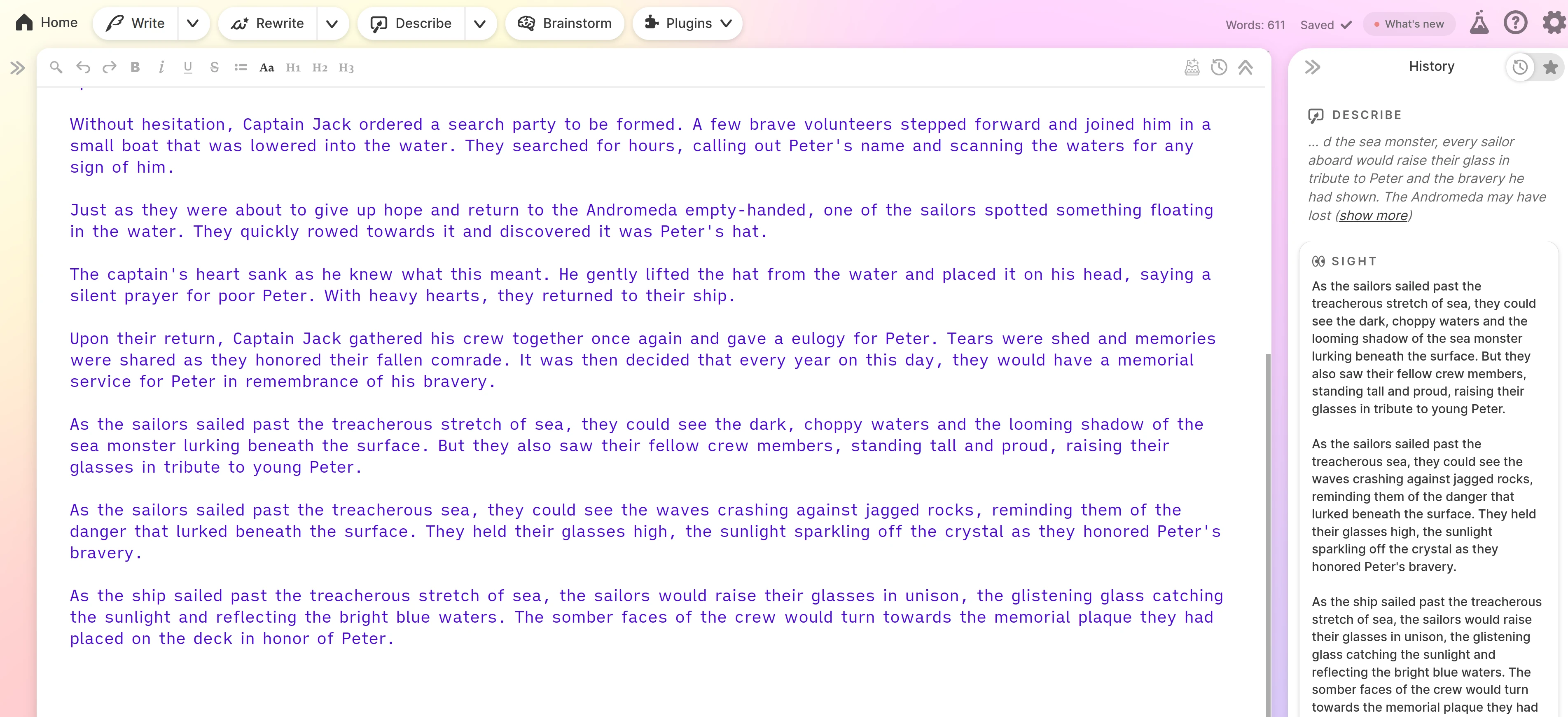
The point is, it covers a lot of ground. And for the most part, it does it well. The AI used by SudoWrite can help generate plot points, character names and descriptions, dialogue suggestions, and even whole paragraphs or scenes.
One of SudoWrite's key features is its ability to learn from you as you write. This means that over time, it will better understand your writing style and preferences and provide more accurate and personalized suggestions. This helps cut down on language that sounds too generic or robotic and makes your writing truly feel like your own.
Key Features
- Story Engine: Based on a "story bible" provided by you, SudoWrite can generate outline of the whole story, broken down by chapters and scenes.
- Continue Writing: Place your cursor at the end of your sentence and ask SudoWrite to continue the scene or paragraph for you.
- Sentence Rewrites: SudoWrite can rewrite sentences according to the criteria you give it (e.g., “show, don’t tell”).
- Description Generations: It can turn sentences into descriptions using all five senses or even metaphors.
- AI Feedback: Receive high-level suggestions from SudoWrite that improve the overall quality and flow of your writing.
- AI Brainstorming: Let AI help you brainstorm with features like AI Canvas (for mind mapping), name and image generation, and more.
Pricing
SudoWrite’s pricing is a bit complicated. It’s based on credits—every time you use an AI feature, it’ll use a certain amount of credits (the amount depends on the feature used and the number of words required).
Every SudoWrite plan includes a certain number of credits:
- Hobby & Student ($10/month) includes 225,000 credits.
- Professional ($22/month) includes 1,000,000 credits.
- Max ($44/month) includes 2,000,000 credits.
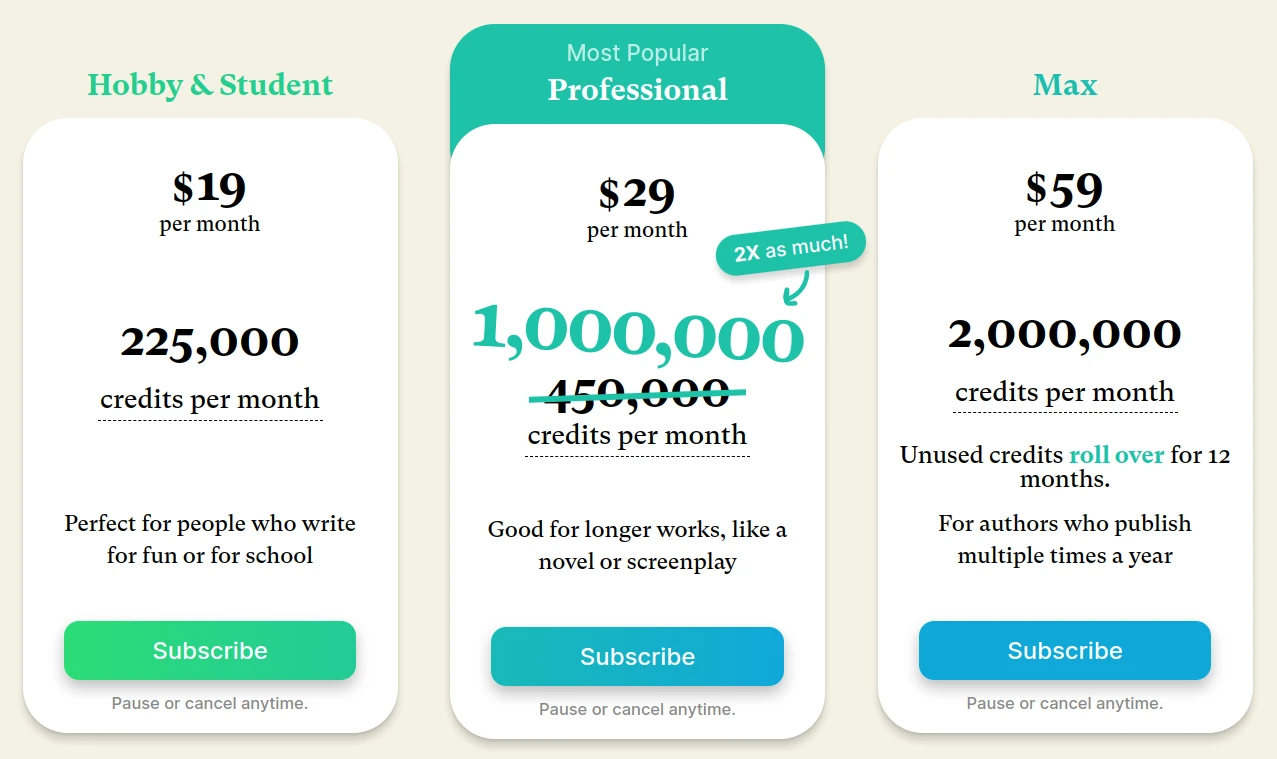
Professional is probably enough credits to write and edit a standard-length novel or screenplay, while Max is designed for publishing multiple times per year. On the Max plan, unused credits also roll over to the next month.
Pros
- Huge range of features.
- Wide selection of models (including premium, open-source, and proprietary models).
- Affordable plans available.
Cons
- Pricing structure is confusing.
- Lacks a plagiarism checker.
- No free plan available.
What Is Novel AI?
NovelAI is quite different from SudoWrite in many ways. Yes, it’s a tool that offers AI-assisted writing, but it's a more pared-down experience that’s focused more on entertainment than it is on creating serious, professional content—although you can still use it for that purpose.
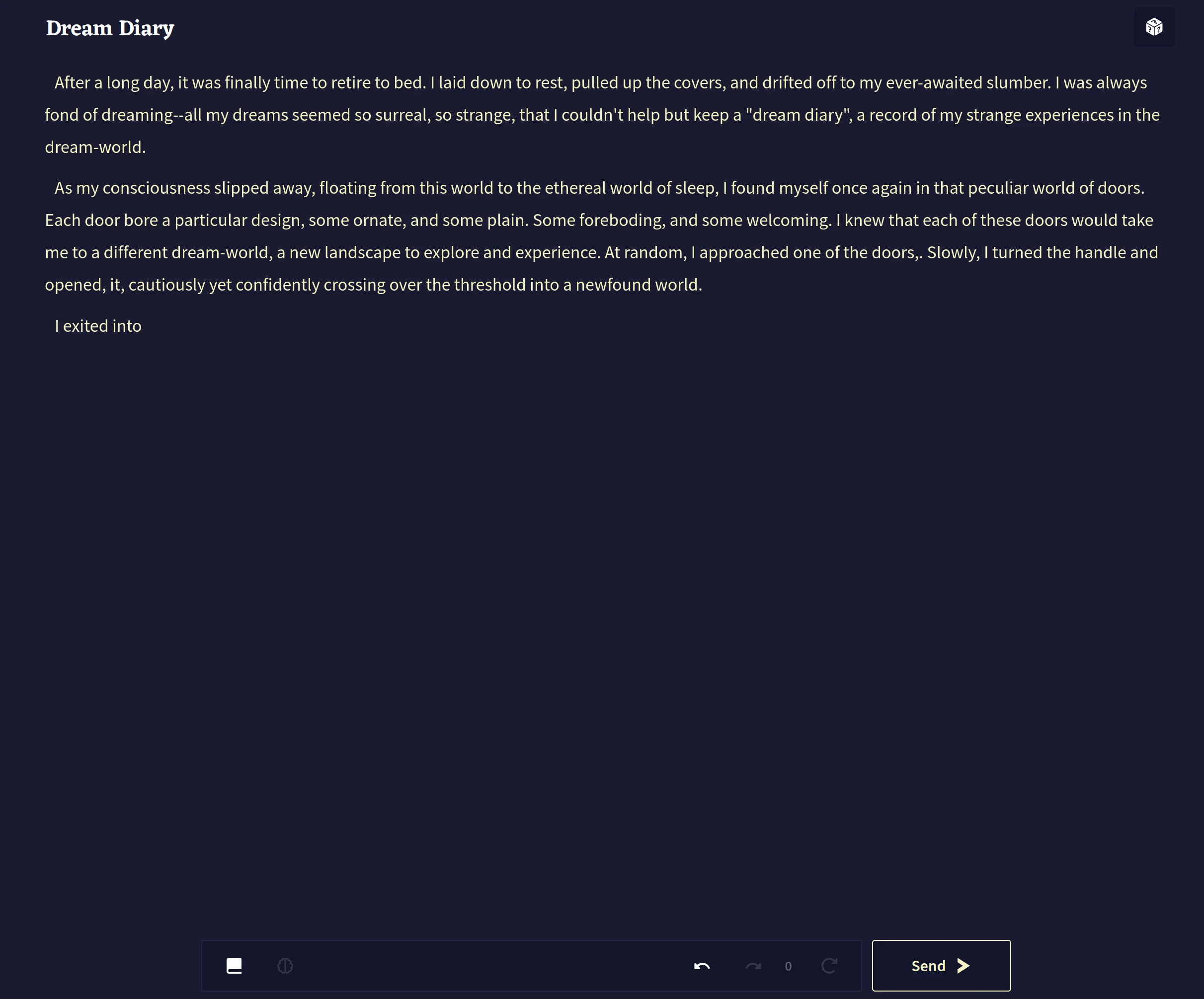
The simpler UI is a giveaway here.
Storyteller is a mode that gives you a blank canvas where you can input your ideas and prompts. At any point, you can let the AI continue the story for you, few words at a time. The AI will take into account the plot and the writing style you’ve established so far.
That said, there are some advanced features under the hood—things like Lorebook that allow you to organize characters and locations, and style emulation tools that help you mimic the writing style of famous authors.
Key Features
- Continue writing: Let the AI continue your story for you based on what you've written so far.
- Story scenarios: Built in library of story scenarios that contain a basic idea and a first few paragraphs of the story.
- Lorebook: Organize and keep track of characters and locations in your story, and make sure the AI represents them accurately.
- Text Adventure: Novel AI comes with a "text adventure" mode that lets you experience a story in a more interactive way.
- Customizable Editor: Personalize the writing environment according to your preferences and style
- Image Generation: Generate images to accompany your writing for a more immersive experience.
Pricing
Novel AI has a fairly limited free trial that allows you to test out most of the features with 50 free AI generations. They do not reset at the start of the month, so choose wisely.
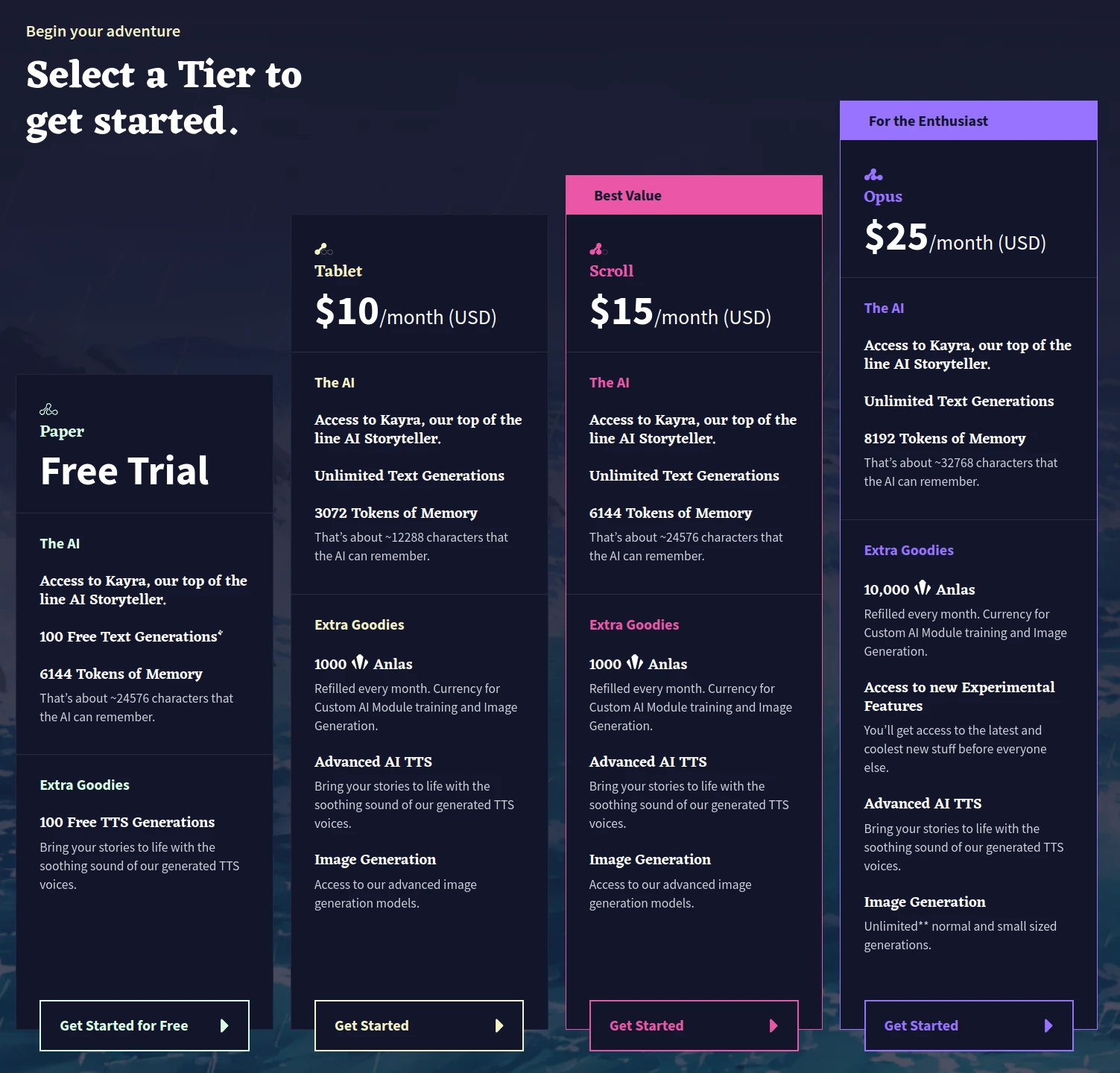
Beyond that, there are three paid plans:
- Tablet ($10/month)
- Scroll ($15/month)
- Opus ($25/month)
All paid plans include unlimited generations, which is a major plus. Higher tiers unlock larger memory token allowances (which basically allow you to create longer, more complicated narratives) and more tokens to use when training custom models and image generation.
Pros
- Simple interface makes it easy to get started.
- Built in library of story scenarios.
- Unlimited generations on all paid plans.
Cons
- Lacks advanced writing features.
- On the Tablet plan, the very low (3072) memory tokens are a significant limitation.
- Free tier feels too limited.
What Is DreamGen?
DreamGen is an AI-assisted creative writing tool that offers balance between serious writing and entertainment with features for both AI story-writing and AI role-play.
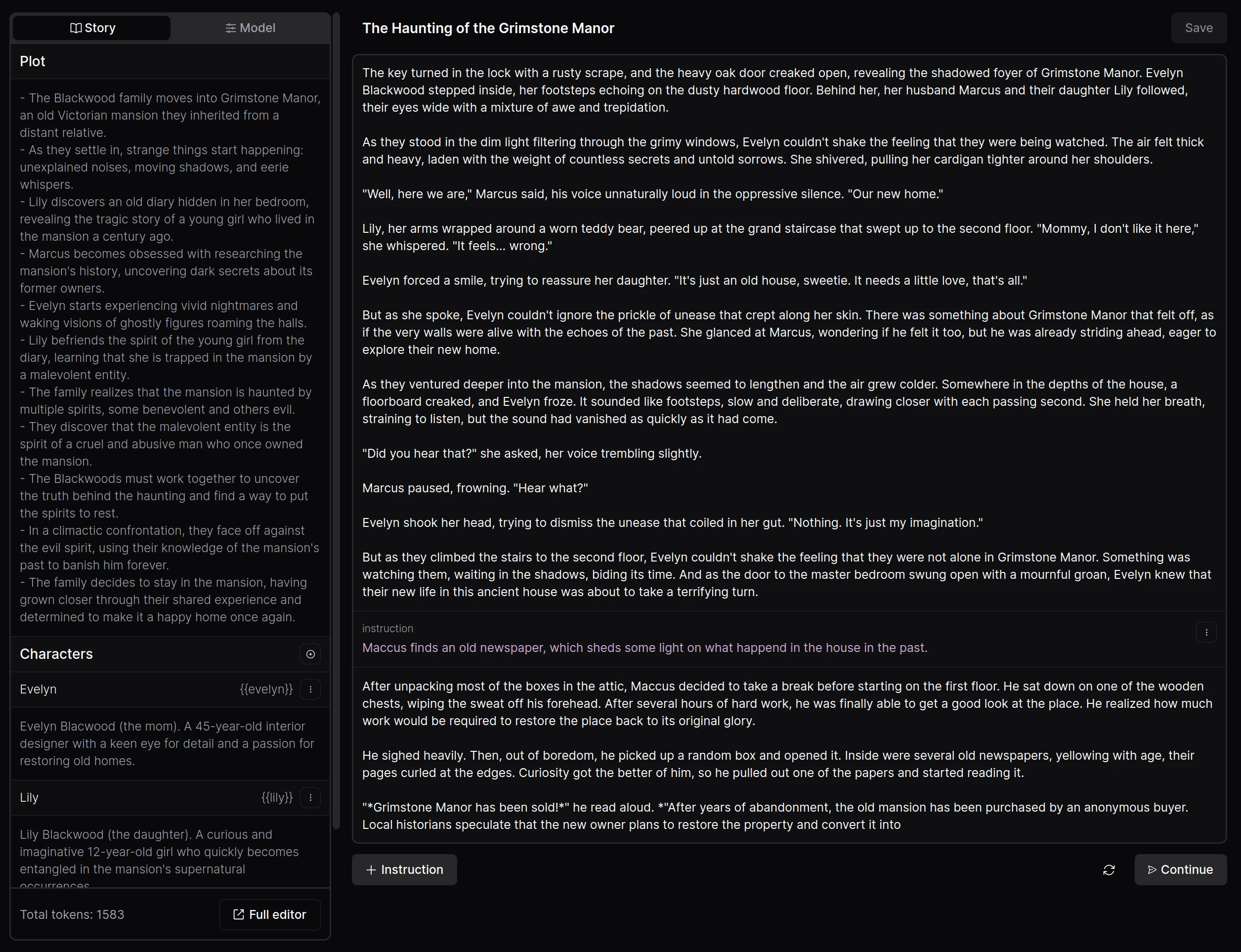
We offer purpose-built, open-source models that let you explore the possibilities of AI-assisted creative writing without limitations or censorship. Plus, you have full control over the model’s outputs, with settings for adjusting randomness, creativity, and more.
In terms of writing features, we offer a simple but effective system for organizing characters, plot points, and other story elements. This is the equivalent of SudoWrite's story bible, but slightly more structured.
You also have multiple options when it comes to directing the story in real-time, including:
- Giving the AI instructions on what the characters should do next, or how the plot should develop, e.g. “Have Alex discover a room in the next 300 words.”
- Changing the writing style, plot or character definitions on the fly.
- Simply hitting “Continue” to see where the AI takes the story next.
Key Features
- Creative Freedom: DreamGen's models come without filters and censorship. Most commercial AI models have built in filters, making it hard to explore certain topics. At DreamGen we understand the importance of creative freedom and have built our models to respect that.
- Customizable Output: Adjust the AI’s settings to control the level of randomness and creativity in your writing.
- Organizational Tools: Keep track of plot points, characters, and more with our intuitive "story bible".
- Writing Style Settings: Tell the AI how the story should be written. Control the point of view, tense, or mimic famous style.
- Story Steering: Influence the narrative direction through natural-language directives to control your characters' choices and actions and overall plot development.
- Continue Writing / Autopilot: Let the AI take full control of the story as you sit back and see where it takes you.
- Scenario Library: Explore a library of story scenarios to jump straight into the action.
- Seamless API Integration: Harness the capabilities of our AI models seamlessly through our OpenAI-compatible API, accessible via your preferred frontend (e.g., SillyTavern).
Pricing
DreamGen has a generous free plan that lets anyone start creating stories and role-plays without any fees.
The paid plans come with more credits, larger context windows (memory), and unlimited access to our models.
You have three options:
- Starter: Great when the smaller AI is all you need.
- Advanced: Leverage the best AI model and have better AI memory.
- Pro: Unlimited use of the best AI model and the largest AI memory.
Pros
- Uncensored AI that stands for creative freedom.
- Ability to steer the story mid-way.
- Built in story-scenarios to spark your creativity.
- Generous free plan.
- Story-writing and role-play modes.
- Models can be accessed over API and are also open-sourced.
Cons
- The scenario library is not the largest.
SudoWrite vs. Novel AI vs. DreamGen: Feature Comparison
| Feature / Aspect | SudoWrite | Novel AI | DreamGen |
|---|---|---|---|
| Unrestricted AI | 🟠 | ✅ | ✅ |
| Customizable Output | ❌ | ✅ | ✅ |
| Autopilot | ✅ | ✅ | ✅ |
| Scenario Library | ❌ | ✅ | ✅ |
| Seamless API Integration | ❌ | ✅ | ✅ |
| Organizational Tools | ✅ | ✅ | ✅ |
| Continue Writing | ✅ | ✅ | ✅ |
| Multiple Models | ❌ | ✅ | ✅ |
| Description Generations | ✅ | ❌ | ✅ |
| Sentence Rewrites | ✅ | ❌ | ✅ |
| AI Feedback | ✅ | ❌ | ❌ |
| AI Brainstorming | ✅ | ❌ | ❌ |
| Style Emulation Tools | ❌ | ✅ | ✅ |
| Image Generation | ✅ | ✅ | ❌ |
| Pricing | |||
| Free Plan | ❌ | 🟠 (limited, does not renew) | ✅ |
| Lowest Paid Plan | $10/month (Hobby & Student) | $10/month (Tablet) | $7.88/month (Starter) |
| Mid Tier Plan | $22/month (Professional) | $15/month (Scroll) | $19.35/month (Advanced) |
| Highest Tier Plan | $44/month (Max) | $25/month (Opus) | $48.30/month (Pro) |
| Pricing Model | Based on credits (unknown number of words per plan). | Unlimited generations, but restrictions on memory tokens and custom model training. | Generous free plan, unlimited generations on Advanced and Pro. |
Conclusion
With all the AI writing tools out there, it can be hard to get your bearings—especially when all of them are claiming to be the best. That's why it's important to understand exactly what each tool offers, how much it costs, and whether it offers value for the money.
In this guide, we’ve tried to give you an unbiased overview of three options for creative writers, covering strengths, weaknesses, and pricing structures. If you’re looking for an intuitive tool for both serious storywriting and engaging role-plays, DreamGen might be the perfect fit.
Want to give DreamGen a try? Sign up for free and start creating without restrictions.
